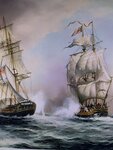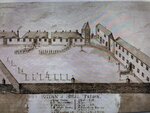

This article, and some to follow, will look at the adventures of Manchester men during the Revolutionary War (1775-1783), as it was fought at sea. There was no U.S. navy, but there was privateering, a time-honored method of creating a seagoing fighting force. The rebel government set up a court system under which private armed warships could be registered and their officers held accountable for their actions in preying on enemy merchant shipping. Little Manchester produced extremely capable and brave men who entered wholeheartedly into this hazardous method of damaging the enemy and earning money (sometimes lots of it) in the sale of captured “prizes” and their cargoes.
AFTER THE BOSTON MASSACRE of March 1770, Massachusetts turned openly hostile to the British authorities, and the clouds of war gathered on the horizon. Manchester was a thoroughly rebel village—not one man remained loyal to the King. In May 1774, a town meeting affirmed Boston’s call for independence. John Lee Jr., Andrew Marsters, and Andrew Woodbury were chosen representatives to the upcoming Essex County Congress of liberty-men, and the latter was elected to the rebel legislature. A nine-man Committee of Correspondence communicated with rebel leaders in other towns.
In June 1774, London closed down the port of Boston and relocated the seat of provincial government to Salem, with Marblehead as the official port of entry, guarded by a British warship in the harbor.
With bloodshed at Lexington and Concord in April 1775, the die was cast. Manchester’s company of militia marched off that morning but did not arrive in time for the fighting. All told, 224 able-bodied men and boys (pop. 800) signed up for the fight against the King’s army and navy.
Capt. William Tuck (1740-1826) of Manchester was chosen to command a merchant vessel on a perilous voyage to Bilbao, Spain, in 1776. There, acting in secrecy as the agent of the independent state of Massachusetts, he exchanged a load of salt fish for a cargo of gunpowder, essential to the fighting capability of the rebel army.
Once the government authorized privateering, Tuck, Jeremiah Hibbert, Benjamin Kimbell, Amos Hilton, and John Lee, all of Manchester, were commissioned as captains of private warships, sailing, with crews that included many other Manchester men, out of large seaports like Gloucester, Newburyport, and Marblehead.
These captains and their men were very tough. While being pursued by a British vessel, Capt. John Lee Jr. (1738-1812), with shots flying thick on the quarter-deck, noticed that his young son was ducking the fusillade. In the thick of the action, Lee thrashed the boy with a rope’s end, saying, “This will teach you to dodge the balls of your country’s enemy!”
Captain Lee (he would move to Marblehead) first commanded the privateer schooner “Hawke,” 6 guns and 30 men, out of Newburyport, and then, on a cruise begun in May, 1777, he commanded the larger privateer brigantine “Fancy”, 12 guns, 75 men (May 1777). While cruising for prey, the “Fancy” was captured by a Royal Navy battleship, and Lee and his men were incarcerated at Mill Prison in Plymouth, England. Immediately, Capt. John Lee began plotting his escape.
To be continued ….